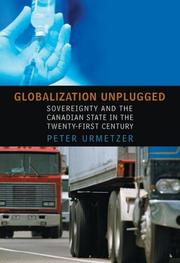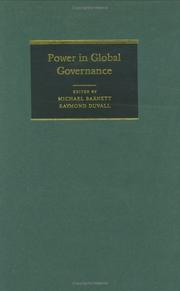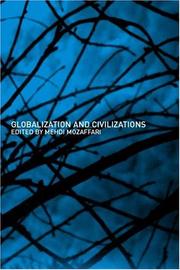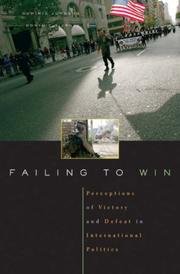| Listing 1 - 10 of 24 | << page >> |
Sort by
|

ISBN: 0802038557 0802037992 144267539X 9786612023637 1282023632 9781442675391 9780802037992 9780802038555 9781282023635 Year: 2005 Publisher: Toronto University of Toronto press
Abstract | Keywords | Export | Availability | Bookmark
 Loading...
Loading...Choose an application
- Reference Manager
- EndNote
- RefWorks (Direct export to RefWorks)
The debate over economic globalization has reached a fever pitch in the past decade and a half with Western governments and multinational corporations trumpeting its virtues and a multitude of activists and developing-world citizens vociferously denouncing it. Both sides would agree that globalization is a recent development that is changing the way people and nations do business, but in Globalization Unplugged, Peter Urmetzer questions whether national economies are losing their sovereignty and whether the topic of globalization merits as much discussion as it receives. Urmetzer's focus is specifically on Canada and he demonstrates that current levels of trade are not unprecedented and, further, that as the economy becomes more service oriented, it will also become less trade dependent. He points out that only a relatively small percentage of Canada's wealth is owned by foreign investors and likewise, only a small portion of the country's wealth is located outside of its borders. Disputing claims that the nation-state is weakening or disappearing altogether, Urmetzer shows how the welfare-state side of government spending - conveniently ignored in the anti-globalization literature yet arguably the most significant development in the political economy of the nation-state in the twentieth century - remains remarkable stable. Written with precision and skill, Globalization Unplugged will spark controversy on both sides of the globalization debate and help deflate the rhetoric of both advocates and detractors.
#SBIB:328H312 --- #SBIB:327.1H20 --- Instellingen en beleid: Canada --- Sociologie van de internationale betrekkingen: algemeen --- Globalization --- Globalization. --- Economic aspects --- Canada --- Economic policy. --- Global cities --- Globalisation --- Internationalization --- International relations --- Anti-globalization movement --- E-books
Book
ISBN: 9780801452376 0801452376 9780801469299 0801469295 9780801469305 0801469309 9781501700668 Year: 2013 Publisher: Ithaca, N.Y. Cornell University Press
Abstract | Keywords | Export | Availability | Bookmark
 Loading...
Loading...Choose an application
- Reference Manager
- EndNote
- RefWorks (Direct export to RefWorks)
"We are living through the endtimes of the civilizing mission. The ineffectual International Criminal Court and its disastrous first prosecutor, Luis Moreno-Ocampo, along with the failure in Syria of the Responsibility to Protect are the latest pieces of evidence not of transient misfortunes but of fatal structural defects in international humanism. Whether it is the increase in deadly attacks on aid workers, the torture and 'disappearing' of al-Qaeda suspects by American officials, the flouting of international law by states such as Sri Lanka and Sudan, or the shambles of the Khmer Rouge tribunal in Phnom Penh, the prospect of one world under secular human rights law is receding. What seemed like a dawn is in fact a sunset. The foundations of universal liberal norms and global governance are crumbling."-from The Endtimes of Human RightsIn a book that is at once passionate and provocative, Stephen Hopgood argues, against the conventional wisdom, that the idea of universal human rights has become not only ill adapted to current realities but also overambitious and unresponsive. A shift in the global balance of power away from the United States further undermines the foundations on which the global human rights regime is based. American decline exposes the contradictions, hypocrisies and weaknesses behind the attempt to enforce this regime around the world and opens the way for resurgent religious and sovereign actors to challenge human rights.Historically, Hopgood writes, universal humanist norms inspired a sense of secular religiosity among the new middle classes of a rapidly modernizing Europe. Human rights were the product of a particular worldview (Western European and Christian) and specific historical moments (humanitarianism in the nineteenth century, the aftermath of the Holocaust). They were an antidote to a troubling contradiction-the coexistence of a belief in progress with horrifying violence and growing inequality. The obsolescence of that founding purpose in the modern globalized world has, Hopgood asserts, transformed the institutions created to perform it, such as the International Committee of the Red Cross and recently the International Criminal Court, into self-perpetuating structures of intermittent power and authority that mask their lack of democratic legitimacy and systematic ineffectiveness. At their best, they provide relief in extraordinary situations of great distress; otherwise they are serving up a mixture of false hope and unaccountability sustained by "human rights" as a global brand.The Endtimes of Human Rights is sure to be controversial. Hopgood makes a plea for a new understanding of where hope lies for human rights, a plea that mourns the promise but rejects the reality of universalism in favor of a less predictable encounter with the diverse realities of today's multipolar world.
Human rights --- World history --- anno 1980-1989 --- anno 1990-1999 --- #SBIB:340H88 --- #SBIB:327.1H20 --- Basic rights --- Civil rights (International law) --- Rights, Human --- Rights of man --- Human security --- Transitional justice --- Truth commissions --- International cooperation. --- Moral and ethical aspects. --- Political aspects. --- Internationaal recht: rechten van de mens --- Sociologie van de internationale betrekkingen: algemeen --- Law and legislation --- International cooperation --- Moral and ethical aspects --- Political aspects

ISBN: 0521666309 0521661773 1107118271 0511171994 0511007116 051114976X 0511309848 0511491557 1280420855 0511048815 9780511007118 9780511048814 9780521661775 9780521666305 9780511491559 9780511309847 9781280420856 9780511171994 9780511149764 9781107118270 Year: 1999 Publisher: Cambridge Cambridge University press
Abstract | Keywords | Export | Availability | Bookmark
 Loading...
Loading...Choose an application
- Reference Manager
- EndNote
- RefWorks (Direct export to RefWorks)
Bill McSweeney addresses the central problem of international relations - security - and constructs a novel framework for its analysis. He argues for the unity of the interpersonal, societal and international levels of human behaviour and outlines a concept of security which more adequately reflects the complexity and ambiguity of the topic. This book introduces an alternative way of theorizing the international order, within which the idea of security takes on a broader range of meaning, inviting a more critical and interpretative approach to understanding the concept and formulating security policy. The recent shift to sociology in international relations theory has not as yet realized its critical potential for the study of security. Drawing on contemporary trends in social theory, Dr McSweeney argues that human agency and moral choice are inherent features of the construction of the social and thus international order, and hence of our conception of security and security policy.
876 Veiligheidspolitiek --- #SBIB:327.1H20 --- #SBIB:327.5H00 --- International relations --- -Coexistence --- Foreign affairs --- Foreign policy --- Foreign relations --- Global governance --- Interdependence of nations --- International affairs --- Peaceful coexistence --- World order --- Sociologie van de internationale betrekkingen: algemeen --- Strategie en vredesonderzoek: algemeen --- Sociological aspects --- Sociological aspects. --- Relations internationales --- Social aspects --- Aspect social --- Coexistence --- National security --- Sovereignty --- World politics --- Social Sciences --- Political Science

ISBN: 0415252792 0415252806 9780415252805 0203098994 9780203098998 9780415252799 1134527284 128115752X 9786611157524 9781134527281 6611157522 9781134527236 9781134527274 Year: 2005 Publisher: Abingdon Routledge
Abstract | Keywords | Export | Availability | Bookmark
 Loading...
Loading...Choose an application
- Reference Manager
- EndNote
- RefWorks (Direct export to RefWorks)
Sport has changed. Traditional boundaries are dissolving as a result of new global conditions. Maguire and his co-authors examine the changes, investigating the power relations that shape sport and providing an example of globalisation at work.
Sports --- Nationalism and sports --- Sports and globalization --- #SBIB:316.7C554 --- #SBIB:327.1H20 --- Globalization and sports --- Globalization --- Sports and nationalism --- Field sports --- Pastimes --- Recreations --- Recreation --- Athletics --- Games --- Outdoor life --- Physical education and training --- Political aspects --- Sociologie van sport: sport en politiek, ideologie --- Sociologie van de internationale betrekkingen: algemeen --- Sports and state --- Sports policy --- State and sports --- Government policy
Book
ISBN: 1283597357 9786613909800 0833052578 0833052497 9780833052575 9780833052490 9781283597357 6613909807 Year: 2011 Publisher: Santa Monica RAND
Abstract | Keywords | Export | Availability | Bookmark
 Loading...
Loading...Choose an application
- Reference Manager
- EndNote
- RefWorks (Direct export to RefWorks)
Governments intervening in post-conflict states find themselves beset with numerous challenges and profound dilemmas: It is often unclear how best to proceed because measures that may improve conditions in one respect may undermine them in another. This volume reviews and integrates the scholarly social-science literature relevant to stabilization and reconstruction, with the goal of informing strategic planning at the whole-of-government level.
Nation-building. --- Peace-building. --- Postwar reconstruction. --- Nation-building --- Peace-building --- Postwar reconstruction --- Law, Politics & Government --- International Relations --- Post-conflict reconstruction --- Reconstruction, Postwar --- Building peace --- Peacebuilding --- Stabilization and reconstruction (International relations) --- State-building --- Political developmentVredesonderzoek: algemeen --- Conflict management --- Peace --- Peacekeeping forces --- Political development --- #SBIB:327.1H20 --- #SBIB:327.5H20 --- Sociologie van de internationale betrekkingen: algemeen --- Vredesonderzoek: algemeen

ISBN: 9780521840248 9780521549523 9780511491207 0511109814 9780511109812 0511109504 9780511109508 0511197381 9780511197383 0511491204 0521840244 0521549523 1107140013 9781107140011 1280415819 9781280415814 0511171625 9780511171628 0511298722 9780511298721 Year: 2007 Volume: 98 Publisher: Cambridge Cambridge University Press
Abstract | Keywords | Export | Availability | Bookmark
 Loading...
Loading...Choose an application
- Reference Manager
- EndNote
- RefWorks (Direct export to RefWorks)
This edited volume examines power in its different dimensions in global governance. Scholars tend to underestimate the importance of power in international relations because of a failure to see its multiple forms. To expand the conceptual aperture, this book presents and employs a taxonomy that alerts scholars to the different kinds of power that are present in world politics. A team of international scholars demonstrate how these different forms connect and intersect in global governance in a range of different issue areas. Bringing together a variety of theoretical perspectives, this volume invites scholars to reconsider their conceptualization of power in world politics and how such a move can enliven and enrich their understanding of global governance.
International relations. Foreign policy --- Power (Social sciences) --- International organization --- International relations --- #SBIB:327.1H20 --- Sociologie van de internationale betrekkingen: algemeen --- Pouvoir (Sciences sociales) --- Organisation internationale --- Relations internationales --- Congresses --- Congrès --- Social Sciences --- Political Science --- Power (Social sciences) - Congresses --- International organization - Congresses --- International relations - Congresses

ISBN: 0203294602 1280056711 0203217977 9780203217979 9786610056712 6610056714 9780415286145 041528614X 9780415286152 0415286158 041528614X 0415286158 9780203294604 9781280056710 9781134448906 9781134448944 9781134448951 1134448945 Year: 2002 Publisher: London Routledge
Abstract | Keywords | Export | Availability | Bookmark
 Loading...
Loading...Choose an application
- Reference Manager
- EndNote
- RefWorks (Direct export to RefWorks)
Globalization and Civilizations challenges established assumptions about the nature of civilizations and the supposed inevitability of the conflict between the Islamic and Western worlds. Uniquely, this edited book critically interrogates the concept of 'civilization' by asking whether it is still valid in the globalized world economy of the twenty-first century. The first half of the book provides an historical and theoretical context to understand the idea of 'civilization' in political science and demonstrates how the various social, economic, political and cultural processes of gl
Civilization, Modern --- Globalization. --- Civilization --- East and West. --- Civilization, Western --- Civilization, Oriental --- Occident and Orient --- Orient and Occident --- West and East --- Eastern question --- Philosophy and civilization --- Global cities --- Globalisation --- Internationalization --- International relations --- Anti-globalization movement --- Philosophy. --- Asian influences --- Oriental influences --- Western influences --- East and West --- Globalization --- #SBIB:327.1H20 --- #SBIB:327.7H01 --- Philosophy --- Sociologie van de internationale betrekkingen: algemeen --- Grondslagen, principes, evolutie internationale gemeenschap

ISBN: 9780674023246 0674023242 0674039173 9780674039179 Year: 2009 Publisher: Cambridge, MA
Abstract | Keywords | Export | Availability | Bookmark
 Loading...
Loading...Choose an application
- Reference Manager
- EndNote
- RefWorks (Direct export to RefWorks)
How do people decide which country came out ahead in a war or a crisis? In Failing to Win, Dominic Johnson and Dominic Tierney dissect the psychological factors that predispose leaders, media, and the public to perceive outcomes as victories or defeats--often creating wide gaps between perceptions and reality.
War --- International relations --- World politics. --- #SBIB:327.5H21 --- #SBIB:327.1H20 --- Colonialism --- Global politics --- International politics --- Political history --- Political science --- World history --- Eastern question --- Geopolitics --- International organization --- Political psychology --- Coexistence --- Foreign affairs --- Foreign policy --- Foreign relations --- Global governance --- Interdependence of nations --- International affairs --- Peaceful coexistence --- World order --- National security --- Sovereignty --- World politics --- MoralePublic opinion. --- Psychological aspects. --- Public opinion. --- Vrede – oorlog, oorlogssituaties --- Sociologie van de internationale betrekkingen: algemeen --- Morale --- Psychological aspects --- Public opinion
Book
ISBN: 9781108425179 9781108441254 1108441254 1108425178 9781108597456 1108651127 1108650309 1108597459 Year: 2018 Publisher: Cambridge : Cambridge University Press,
Abstract | Keywords | Export | Availability | Bookmark
 Loading...
Loading...Choose an application
- Reference Manager
- EndNote
- RefWorks (Direct export to RefWorks)
Mainstream international relations continues to assume that the world is governed by calculable risk based on estimates of power, despite repeatedly being surprised by unexpected change. This ground breaking work departs from existing definitions of power that focus on the actors' evolving ability to exercise control in situations of calculable risk. It introduces the concept of 'protean power', which focuses on the actors' agility as they adapt to situations of uncertainty. Protean Power uses twelve real world case studies to examine how the dynamics of protean and control power can be tracked in the relations among different state and non-state actors, operating in diverse sites, stretching from local to global, in both times of relative normalcy and moments of crisis. Katzenstein and Seybert argue for a new approach to international relations, where the inclusion of protean power in our analytical models helps in accounting for unforeseen changes in world politics.
International relations --- World politics --- Power (Social sciences) --- Peaceful change (International relations) --- Peace --- Empowerment (Social sciences) --- Political power --- Exchange theory (Sociology) --- Political science --- Social sciences --- Sociology --- Consensus (Social sciences) --- Coexistence --- Foreign affairs --- Foreign policy --- Foreign relations --- Global governance --- Interdependence of nations --- International affairs --- Peaceful coexistence --- World order --- National security --- Sovereignty --- #SBIB:327.1H10 --- #SBIB:327.1H20 --- Internationale betrekkingen: theorieën --- Sociologie van de internationale betrekkingen: algemeen --- World politics. --- Colonialism --- Global politics --- International politics --- Political history --- World history --- Eastern question --- Geopolitics --- International organization
Book
ISBN: 9780521768726 9780521125666 9780511779893 9780511789762 0511789769 9780511787157 0511787154 0511779895 0521768721 0521125669 0511850352 1107209277 1282723596 9786612723599 0511789025 0511786018 0511788290 Year: 2010 Publisher: Cambridge Cambridge University Press
Abstract | Keywords | Export | Availability | Bookmark
 Loading...
Loading...Choose an application
- Reference Manager
- EndNote
- RefWorks (Direct export to RefWorks)
Why do advocacy campaigns succeed in some cases but fail in others? What conditions motivate states to accept commitments championed by principled advocacy movements? Joshua W. Busby sheds light on these core questions through an investigation of four cases - developing-country debt relief, climate change, AIDS, and the International Criminal Court - in the G-7 advanced industrialized countries (Canada, France, Germany, Italy, Japan, the United Kingdom, and the United States). Drawing on hundreds of interviews with policy practitioners, he employs qualitative, comparative case study methods, including process-tracing and typologies, and develops a framing/gatekeepers argument, emphasizing the ways in which advocacy campaigns use rhetoric to tap into the main cultural currents in the countries where they operate. Busby argues that when values and costs potentially pull in opposing directions, values will win if domestic gatekeepers who are able to block policy change believe that the values at stake are sufficiently important.
Social change --- General ethics --- Political sociology --- #SBIB:327.1H20 --- Sociologie van de internationale betrekkingen: algemeen --- International relations --- Nonprofit organizations --- Pressure groups --- Social action --- Values --- Axiology --- Worth --- Aesthetics --- Knowledge, Theory of --- Metaphysics --- Psychology --- Ethics --- Advocacy groups --- Interest groups --- Political interest groups --- Special interest groups (Pressure groups) --- Functional representation --- Political science --- Representative government and representation --- Lobbying --- Policy networks --- Political action committees --- Social control --- Corporations, Nonprofit --- Non-profit organizations --- Non-profit sector --- Non-profits --- Nonprofit sector --- Nonprofits --- Not-for-profit organizations --- NPOs --- Organizations, Nonprofit --- Tax-exempt organizations --- Associations, institutions, etc. --- Social Sciences --- Political Science
| Listing 1 - 10 of 24 | << page >> |
Sort by
|

 Search
Search Feedback
Feedback About UniCat
About UniCat  Help
Help News
News